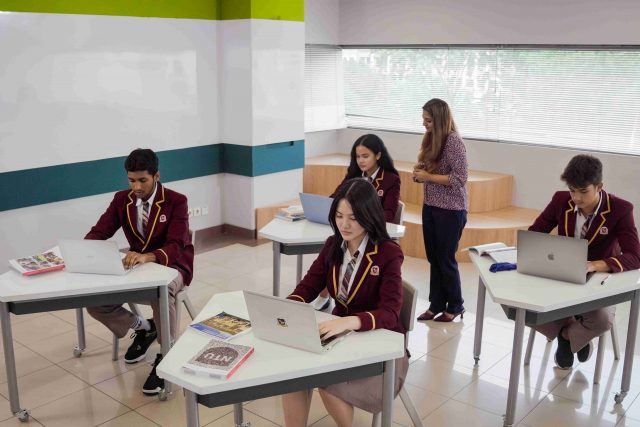MYP Command Terms Individuals and Societies

Understanding the MYP command terms Individuals and Societies is crucial for students on their International Baccalaureate (IB) educational journey. These terms are crucial for the assessment and learning across various subjects.
Also, these command terms offer a structured approach to academic inquiry and expression. If you are interested in the IB Middle Year Programme (MYP), let’s delve into how these terms are introduced, applied, and assessed within the framework here.
What is the Command Term in MYP?
In general, command terms serve as instructional cues, signalling to students the specific actions they need to take when responding to questions or tasks.
For example, terms like “analyse,” “evaluate,” and “describe” prompt students to engage in distinct cognitive processes and levels of thinking.
By understanding these terms, students can tailor their responses accordingly, demonstrating their comprehension, critical thinking skills, and depth of understanding.
Moreover, command terms promote consistency and coherence across different subjects within the MYP curriculum.
Regardless of the academic discipline, students encounter familiar command terms that facilitate a shared understanding of assessment expectations and learning objectives.
One of the subjects that involves the use of command terms is Individuals and Societies. So, the MYP command terms Individuals and Societies are instructional cues that guide students on what actions to take when engaging with social sciences and humanities concepts.
Application in Research
The application of command terms in research is crucial for students to navigate academic inquiries effectively. These terms, such as “formulate,” “investigate,” and “justify,” guide students in conducting thorough investigations and articulating their findings.
When applied specifically in the context of MYP command terms Individuals and Societies, it also plays a vital role in shaping students’ research endeavours. Here are some examples of MYP command terms for individuals and society subjects:
- Analyse: Break down to find the important bits. Look at parts and connections and understand information to make decisions.
- Demonstrate: Show or explain with reasons or examples, proving your point.
- Describe: Tell all about a situation, event, or process in detail.
- Discuss: Talk about a topic, considering different views and giving evidence for your opinion.
- Document: Give credit to sources by mentioning them properly. Include references in your work and, at the end, in a list.
- Evaluate: Judge and decide the impact or limits of ideas, works, or methods based on certain standards.
- Exemplify: Show with an example.
- Explain: Tell the reasons or causes behind something. Investigate: Look closely at something, study it, and find out new things.
- Formulate: Express ideas or arguments clearly and in order.
- Identify: Choose an answer from many possibilities. Notice and say briefly what makes something different.
- Interpret: Understand trends and make conclusions from given information.
- Investigate: Look closely at something, study it, and find out new things.
- Justify: Give good reasons or proof to support an answer or decision.
- Recognise: Identify through patterns or features.
- Reflect: Think deeply about something; consider it carefully.
- Summarise: Pick out the main points or themes.
- Synthesise: Combine different ideas to make a new understanding. Use knowledge or rules to solve problems or apply theory.
These MYP command terms Individuals and Societies can be applied in the learning process to hone students’ research skills.
For instance, when formulating research questions, students must consider the command term “formulate” to express their inquiries clearly and systematically. This ensures that their research questions are focused and purposeful, aligning with the objectives of the study.
Developing Critical Thinking and Deep Knowledge
Furthermore, MYP command terms play a pivotal role in nurturing students’ critical thinking abilities and fostering a deeper understanding of various subjects.
A specific example can be seen in MYP command terms Individuals and Societies; these terms can be a guiding principle for students to explore historical, geographical, political, and social phenomena.
By employing terms like “investigate,” “discuss,” and “evaluate,” students are prompted to critically examine diverse perspectives, analyse historical events, and assess the implications of societal issues.
Assessment Criteria
In Individuals and Societies, the MYP command terms assessment criteria play a pivotal role in assessing students’ ability to engage with historical, geographical, political, and social concepts.
These MYP command terms Individuals and Societies assessment criteria have eight achievement levels ranging from 1 to 8, which are grouped into four bands with specific descriptors that teachers use to assess students’ work, including:
- Criterion A – Knowing and Understanding
- Criterion B – Investigating
- Criterion C – Communicating
- Criterion D – Critical Thinking
Also Read: Best International School Indonesia for Your Children’s Brighter Future
Classroom Implementation
Implementing MYP command terms in the classroom involves various strategies aimed at familiarising students with these crucial elements of academic language and assessment criteria, such as:
-
Give Instructions
Teachers can integrate command terms into their instructions for assignments, tasks, and assessments.
-
Questioning Students
Teachers can pose thought-provoking questions that prompt students to apply command terms in their responses, thereby reinforcing their understanding and usage.
-
Posing Problems
By presenting real-world scenarios or academic challenges, teachers encourage students to analyse, evaluate, and justify their responses using appropriate command terms.
-
Eliciting Responses
Through peer interaction and collaborative learning experiences, students practise articulating their ideas and arguments using the language of command terms.
These strategies can be implemented in any subject group, including the MYP command terms Individuals and Societies. For a transformative IB learning experience, you can explore BINUS SCHOOL Simprug’s innovative curriculum with us.
References:
https://guide.fariaedu.com/whole-school-approach-to-command-terms/command-terms-in-eassessment-questions-myp
https://www.isb.rs/site/page/academics/upper-school/myp-individuals-and-societies/4922
https://www.ibo.org/globalassets/new-structure/brochures-and-infographics/pdfs/myp-brief_individuals-societies_2015.pdf
https://ludincdnhistory.weebly.com/uploads/3/8/7/4/38741495/command_terms_.pdf
https://www.woostercolts.com/cms/lib/NV02000980/Centricity/Shared/pdf/ib/ibmyp/ibmyp-command-terms.pdf
https://www.montgomeryschoolsmd.org/siteassets/schools/middle-schools/n-r/clementems/uploadedfiles/programs/command20terms20in20the20myp.pdf



